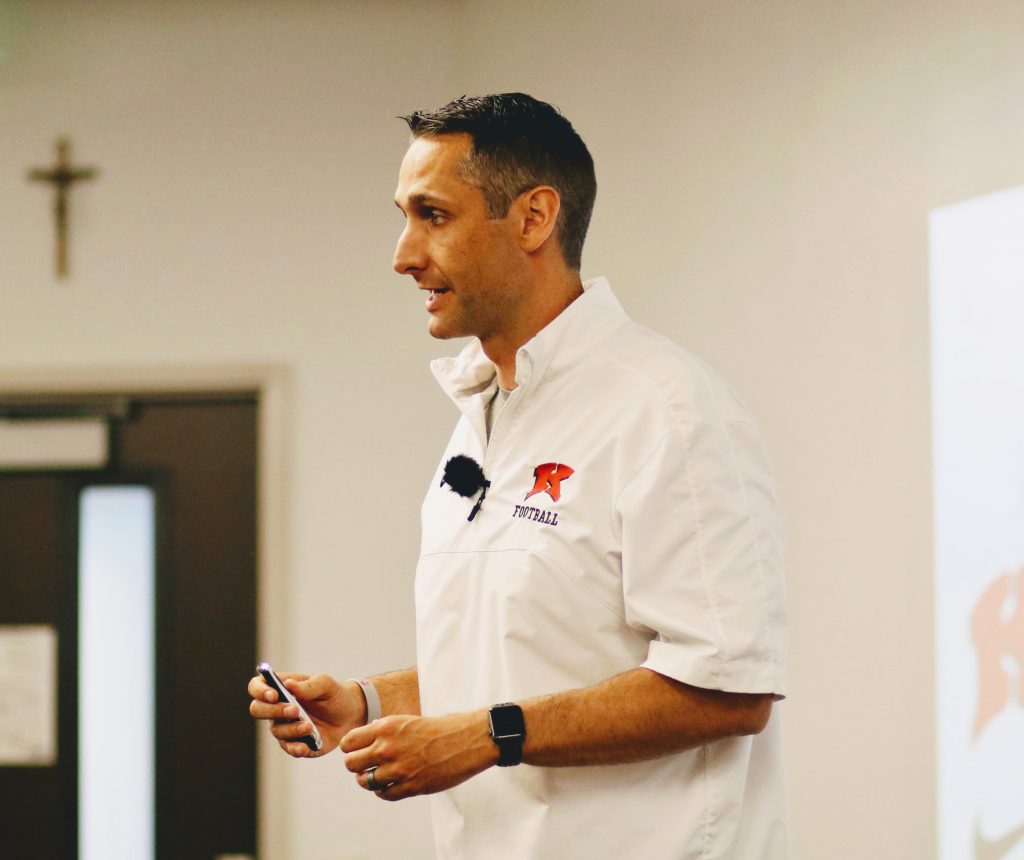
Steve Jones and RPR Leadership
Being a parent is difficult. Being a coach and a parent with a child who is an athlete takes it to another level. The scenario creates all kinds of expectations, whether real or perceived by both parties. This past year I found that out first hand. My daughter has always been a standout in youth sports, especially basketball. She had been raised in an environment where athletes and coaches always wanted to reciprocate my help by helping my daughter. My daughter’s babysitter was the starting point guard from Stanford. The babysitting usually consisted of taking my daughter to a court and practice shooting and dribbling and other basketball skills that would play a huge role in my daughter’s success. So, when she made it to high school, she was moved up to the varsity team as a freshman and started the whole season. She had a productive season as a freshman, played well, and didn’t seem to back off from older athletes. When the season ended, she started playing in the various off-season programs, games, and camps and all the other things that come with playing high school sports these days. Coming up into her sophomore year and off of a very good volleyball season, she decided she didn’t want to play basketball anymore. As a coach, I was befuddled. As a parent who really enjoyed basketball season, it was difficult to swallow. She tried playing a little bit and then decided she just couldn’t do it anymore. What happened? From what she said, there are a lot of factors that went into her quitting. I never got a straight answer but racked my brain as to what could have happened. How could a coach’s kid quit?
As my family was digesting this, I hosted TFC-7 in December. One of the speakers that Tony Holler selected was Steve Jones from Kimberly, Wisconsin. You may know him as the coach who’s won 70 consecutive football games (14-0 for the past five seasons). Tony brought him in to teach about leadership and mental toughness. At first thought, I didn’t think much of it as I have read many books and seen many presentations on leadership and mental toughness. But I figured since Tony invited him he must be pretty good. I invited my daughter and some of her friends to attend the session and get their perspective on Coach Jones. About halfway through the session, I felt like I’ve been given an early Christmas gift. All the things that Coach Jones talked about seemed to be speaking directly to me and my daughter. After his presentation, I felt I needed to go up and talk to him and share my story and thank him for everything that he said because he just explained everything that my daughter and myself had been through. Coach Jones is such a concerned individual that he went and found my daughter and sat and chatted with her about the events that transpired earlier in the year. After that, I went up and found my daughter and asked her what she thought. Having been the veteran of many leadership conferences and clinics through her high school and other events, she said it was unlike anything she had ever seen. Coach Jones seemed to know the pulse of every high school athlete, their fears, expectations and dreams. What made the presentation so unique, is that he actually had a plan on how to deal with this from not only a team setting but also an individual perspective. Most of these talks just throw out an abstract idea and hope you can connect the dots. Coach Jones was different. And this was just his first of two presentations.
On Saturday, I attended Steve’s second session that delved further into leadership and mental toughness. All coaches preach leadership and mental toughness but really don’t give their athletes the tools needed to meet expectations. Steve Jones showed concrete examples of how his program’s culture impacted his team, on and off the field.
By the end of the weekend, I was so moved by what I witnessed that I pulled Steve Jones aside after everyone left and ask him if he’d be interested in becoming part of Reflexive Performance Reset and develop a RPR Leadership Program. I thought that using RPR as a platform, we could reach more coaches who could give their athletes the skills to cope, lead, and excel. And maybe, prevent athletes from quitting sports they once loved.
RPR comes into the picture by tying together the brain and body. One follows the other and vice versa. One of our brains primary goals is to protect itself. If our body is in a flight or fight or imploding state, it’s more concerned with protection. It becomes difficult to make performance decisions when we are in an imploded state. It becomes difficult for our brain to focus on performance. For example, ticklishness is a fight or flight response to sensation. How well can you make a decision while someone is tickling you? I know this is an extreme example, but the brain doesn’t understand extremes. It reverts to basic survival. With RPR, the body will be in a performance state so you can make better decisions because your brain is not longer worried about protection.
Combining the body and brain with mental toughness and leadership led to “RPR Leadership”. RPR Leadership will give you the tools to train your athletes to deal with the difficult mental scenarios high school athletes face in their busy, complicated lives. You will learn the tools needed to make sure your athletes can deal with stress and come out on top. Your athletes will achieve their goals without letting themselves and their own thoughts get in the way.
Here is a link to sign up. It will be limited to 25 people.
